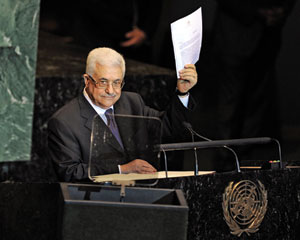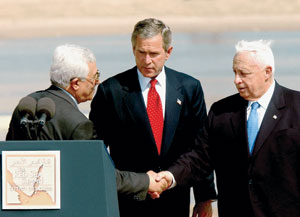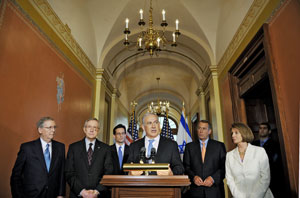CQ WEEKLY – COVER STORY
Oct. 15, 2011 – 12:23 p.m.
Israel: The Ties That Bind
By Jonathan Broder, CQ Staff
Last month, the House Foreign Affairs Committee gathered to review U.S. aid to the Palestinian Authority after its president, Mahmoud Abbas, defied the Obama administration, Israel and its supporters on Capitol Hill with his bid for Palestinian statehood at the United Nations. Florida Republican Rep.

|
||
|
Surprisingly, however, the witnesses declined to endorse her cut-off threat. Although they agreed that the Palestinians’ gambit was misguided, they sided with the Obama administration, which wants to continue the $600 million in annual U.S. economic and security assistance that goes to the governing Palestinian Authority, or PA.
“The best response is not to zero out all aid to the PA,” Elliott Abrams, the top Middle East adviser on President George W. Bush’s National Security Council, told the panel. “Some programs are very much in our own interest and Israel’s, such as the security programs.” David Makovsky, a regional expert at the pro-Israel Washington Institute for Near East Policy, warned that the only beneficiaries of a U.S. aid cutoff would be the Islamic militant group Hamas. Behind the scenes, Israeli officials also urged lawmakers not to cut off aid.
The entreaties fell mostly on deaf ears. Earlier this month, Ros-Lehtinen confirmed that she had effectively blocked U.S. aid to the Palestinians by refusing to approve the disbursement of additional funds. “This is about protecting U.S. national security interests and taxpayer dollars,” says Ros-Lehtinen. Texas Republican
Such is the strength of Israel’s position on Capitol Hill, where both Republicans and Democrats have ended up taking an even harder line than the Israelis. President Obama, who came into office with grand hopes of revitalizing the peace process, quickly found himself isolated and eventually boxed in by the ferocity of lawmakers’ support for Israel. By the time the Palestinians launched their statehood bid, he came down firmly on the side of the Israelis and is working actively to scuttle or defeat it, a move that has enraged the Palestinians and their Arab supporters.
The eventual impact could extend well beyond the immediate crisis and end up rewriting the U.S. role in Middle East peacemaking. Indeed, the episode could mark an end to a role the United States has played for more than three decades as an honest broker in the long-running Middle East peace process. During that time, presidents were able to win congressional support for their mediation efforts, even if Israel’s supporters objected. But today, Congress has been able to tilt the balance decisively, effectively blocking Obama from playing any meaningful diplomatic role in the Israeli-Palestinian conflict before the 2012 elections.
“For the first time, there is a broad recognition of the emptiness of the American claim that the U.S. is uniquely qualified to bring the Israel-Palestine conflict to an end,” Henry Siegman, a Middle East expert at the Council on Foreign Relations, wrote on his blog last week.
Encountering New Limits

|
||
|
The Obama administration is still adjusting to this new reality. Strong bipartisan support in Congress for the Jewish state has stymied Obama’s efforts to pressure the right-wing government of Prime Minister Benjamin Netanyahu to fully halt Jewish settlement construction in the occupied West Bank. Indeed, in a speech before a joint meeting of Congress in May, Netanyahu won standing ovations for his hard-line positions, even though many critics say they have brought the U.S.-mediated peace talks to a standstill. In Congress, says Massachusetts Democratic Rep.
Now, Republicans and their supporters have upped the ante even further, adding full-throated support for Israel as a new litmus test for the 2012 election and effectively politicizing what had long been a bipartisan issue. When Obama used a speech to the United Nations last month to threaten a veto of the Palestinian statehood bid — despite his call a year earlier at the same podium for Palestinian independence — many critics saw it as a bid to maintain the support of American Jews.
For lawmakers attuned to parochial political concerns, assessing the international impact of their actions has never been a top priority, particularly with a presidential election only a year away. But Middle East experts warn that Congress’ success in blunting Obama’s mediation efforts is having major implications for the United States overseas. These experts say U.S. credibility in the Middle East has suffered deep and lasting damage at a time when Palestinians — and Arabs in general — are looking for allies to support their calls for democracy. And they warn that Washington’s diminished diplomatic stature opens a political vacuum in one of the world’s most volatile and strategic regions, increasing the prospect for violence as other countries try to step in.
Israel: The Ties That Bind
There is a long history of U.S. presidents playing the role of honest broker — and buffer — in the Middle East conflict, refusing to back down when differences arose with right-wing Israeli leaders or when Israel’s vocal supporters on Capitol Hill rose in its defense.
In 1991, President George Bush conditioned a $10 billion loan guarantee to help Israel absorb new immigrants on an Israeli pledge not to settle the newcomers in the occupied West Bank. Israeli Prime Minister Yitzhak Shamir insisted on the Jewish right to settle in the West Bank, and legions of pro-Israel lobbyists swarmed Capitol Hill to draw lawmakers to Israel’s side. But Bush stood his ground, and in the end, Congress supported his conditions for the loan guarantees.
President Bill Clinton donned the mediator’s mantle in 1993 after Israel and the Palestine Liberation Organization signed the Oslo Accords. In negotiations between Israel and the new Palestinian Authority over the next step of the accords, Clinton clashed bitterly with Netanyahu, then in his first term as prime minister. But Clinton persevered against pro-Israel critics in Congress and won agreement for a partial Israeli withdrawal from the West Bank.
U.S. credibility as a Middle East mediator began to erode during the administration of George W. Bush, who increasingly sided with Israel as it fought with the Palestinians over the issue of continued Israeli settlement in the West Bank. In 2002, Bush presented what he termed a “road map” for a peace agreement, which, among other things, called on Israel to halt its settlement activity. But two years later, Bush sent a letter to Israeli Prime Minister Ariel Sharon, saying he recognized the “demographic realities” created by large Israeli West Bank settlements and therefore did not expect Israel to return to its pre-1967 borders in a final peace agreement. Bush also sided with Israel in affirming that Palestinian refugees displaced by Israel’s creation in 1948 did not have a “right of return” to their former homes.
Many Palestinians, as well as left-wing Israelis, saw Bush’s policies as an abrogation of Washington’s historic honest broker’s role. Of course, many in Congress say the United States never truly played that role.
“I don’t think that we’ve ever been an honest broker between them, nor should we have been,” says Frank. “We have a commitment to Israel. In the Arab world, they won’t even admit that Israel should exist. To get Israel to be willing to make peace, they need to know they’ve got supporters and some friends.”
A number of lawmakers insist that the U.S. mediation role is far from over, and that the United States is still the only country that all sides will listen to. “Everybody understands that we have our favorites in these discussions. But people are demanding that we play a role,” New York Democratic Rep.
Still, by the end of Bush’s presidency, Palestinians looked to Obama to restore balance to the U.S. approach. A day after his inauguration, Obama signaled that Middle East peacemaking would be a top priority, appointing former Democratic Sen. George J. Mitchell of Maine as his special envoy to the region. But in numerous trips there, Mitchell, who had successfully brokered the 1998 Northern Ireland peace deal, struggled just to draw Israelis and Palestinians back to the negotiating table.
In June 2009, shortly after Obama delivered a speech in Cairo in which he said the United States “does not accept the legitimacy of continued Israeli settlements,” Netanyahu, now in his second stint as prime minister, agreed to a partial 10-month halt in new Jewish settlement construction in the West Bank. But he excluded thousands of housing units that already had government approval, as well as building in East Jerusalem, which Israel annexed in 1967. Desperate to get the peace talks restarted, Secretary of State
In protest, however, the Palestinians refused to resume peace talks until one month before the settlement freeze was due to expire. As soon as construction resumed, the talks broke down again.
In March 2010, while Vice President
As the settlement dispute deepened, a number of American Jewish leaders, as well as pro-Israel lawmakers such as Ackerman, criticized Obama for publicizing his differences with Netanyahu and urged him to deal with the issues quietly. In November, the administration shifted its approach to Netanyahu, offering to provide Israel with long-term guarantees of political support at the United Nations, as well as an additional $3 billion worth of weapons, all in exchange for a 90-day extension of the settlement freeze. Under pressure from pro-settler members of his coalition, Netanyahu rejected the offer.
“The request to renew the freeze is a trap that Israel must not fall into,” the principal Jewish settler organization said at the time.
Israel: The Ties That Bind
Politicizing Israel

|
||
|
The political dynamic shifted again in the run-up to the November 2010 midterm election, which marked the beginning of an overt Republican strategy to use support for Israel as a political club against Obama.
Shortly after the election, new Republican House Majority Leader
At the time, veteran diplomatic observers could not recall another instance where a leader of the congressional opposition met with a foreign leader and announced, as a matter of policy, that he would side with that leader against the U.S. president. Cantor’s office dismissed such characterizations of the meeting, noting that he enjoyed a “longstanding friendship” with Netanyahu and “appreciated the opportunity to catch up.”
But some analysts say Cantor was also responding to political pressure from a new right-wing advocacy group called the Emergency Committee on Israel, which was formed several months before the midterms to undermine Obama’s Middle East policy and its Democratic supporters on Capitol Hill. The group is led by William Kristol, the neoconservative editor of the Weekly Standard, and Gary Bauer, head of the socially conservative American Values group and an executive board member of Christians United for Israel, an evangelical pro-Israel lobby.
In the run-up to the midterms, the group ran ads going after Rep. Joe Sestak of Pennsylvania, the Democratic Senate candidate, for criticizing Israel’s blockade of the Gaza Strip and not signing on to a letter defending Israel that was circulated by the American Israel Public Affairs Committee, the largest pro-Israel lobby. Sestak lost the election to conservative Republican
In February, Obama tried to shore up U.S.-Israeli relations — and address growing doubts among American Jewish groups about his attitude toward Israel. At the United Nations, U.S. Ambassador
Critics saw the U.S. veto as a foreign policy embarrassment for Obama, who appeared unwilling to stand behind his own policies. Moreover, they noted, the president was providing Israel with political support and getting nothing in return from Netanyahu.
A Capitol Invitation
Meanwhile, Cantor and Netanyahu were preparing another political surprise for Obama. According to GOP congressional aides, Cantor, at Netanyahu’s request, arranged for the Israeli leader’s May address to the joint meeting of Congress. In anticipation of a hero’s welcome for Netanyahu on Capitol Hill — not to mention further damage to Obama’s image among Palestinians as an honest broker — the president said for the first time that Israel’s pre-1967 lines must serve as the starting point for negotiations over Israel’s final border. This was a clear nod to the Palestinians, who seek to have their state comprise all of the territory that Israel occupied in the 1967 Middle East war. But in a nod to established Israeli settlements in many of those areas, Obama also said in a speech that any final borders had to include “mutually agreed swaps” of Israeli and Palestinian lands “so that secure and recognized borders are established for both states.”
The president’s position was essentially another way of affirming Bush’s 2004 letter about final borders. It also conformed with a previous joint statement by Netanyahu and Clinton. But Republicans seized upon Obama’s mention of the 1967 borders as a dramatic shift in U.S. policy and used it to question his commitment to Israel’s security.
“The president’s new decision to alter U.S. policy regarding the Israeli-Palestinian peace process concerns me,” Republican Sen.
Israel: The Ties That Bind
Democrats also criticized Obama for fumbling the announcement. “He got hammered because he didn’t articulate it right,” says Ackerman. “Bush explained it better. He put it in context.”
On May 20, Mitchell stepped down as Obama’s special Middle East envoy amid growing frustration over the lack of any diplomatic progress. Visiting the White House later the same day, Netanyahu used a photo opportunity to lecture Obama publicly about “the indefensible boundaries of 1967.” In his May 24 speech to Congress, Netanyahu reminded Obama of the need for flexibility in any final negotiations. Such wariness and distrust of Obama has now become the dominant theme among GOP presidential candidates when it comes to the issue of Israel. In May, former Massachusetts Gov. Mitt Romney said Obama “threw Israel under the bus” by calling for peace talks based on the 1967 lines. He never mentioned Obama’s land-swaps qualifier.
Texas Gov.
“The president is not reflecting the pro- Israel stance that I think the Israeli government wants to see,” says Utah Republican Rep.
In at least one case so far, the GOP’s assertive approach on Israel appears to have worked. In the August special election for the congressional seat in New York’s heavily Jewish — and Democratic — 9th District, Republican operatives successfully tarred Democrat David Weprin, an Orthodox Jew, with Obama’s Middle East policies, even though Weprin campaigned as an outspoken critic of Obama’s approach. The seat went to Republican
“What we’re seeing is a transition from Israel’s being primarily a Jewish issue to Israel being a core conservative principle in America,” said David Brog, executive director of Christians United for Israel, an evangelical pro-Israel lobby. “Support for Israel is right up there with other conservative approaches such as limited government and a role for faith in the public square.”
Last-Ditch Effort
Obama’s most recent attempt to salvage what remains of the U.S. role in the Middle East peace process began with his speech last month before the United Nations, in which he pleaded with the Palestinians to abandon their U.N. bid for statehood and return to the negotiating table with Israel. He let it be known that the United States did not want to use its veto again in the Security Council, but if the Palestinians forced his hand, he would.
“Peace will not come through statements and resolutions at the United Nations,” Obama said. “Ultimately, it is the Israelis and the Palestinians — not us — who must reach agreement on the issues that divide them: on borders and on security, on refugees and Jerusalem.”
Obama then underscored his “unshakable” commitment to Israel’s security. “Israel is surrounded by neighbors that have waged repeated wars against it,” he said. “The Jewish people carry the burden of centuries of exile and persecution, and fresh memories of knowing that 6 million people were killed simply because of who they are. Those are facts. They cannot be denied.”
Few would argue with Obama’s description of Israel’s geopolitical predicament or the Jews’ grim history of persecution. But critics noted that the speech contained no mention of the Palestinians’ plight under occupation or the seizure of their land for Israeli settlements.
Obama’s stature as a potential Middle East mediator has been undermined further by the hold that Congress has placed on Palestinian aid and language in several fiscal 2012 appropriations and authorization bills that threaten to cut off aid altogether if Abbas’ statehood bid goes forward at the United Nations.
“No one seems to be asking who would benefit most if they were actually to get this passed,” says former Florida Democratic Rep. Robert Wexler. “The fact is that it’s Hamas.”
Israel: The Ties That Bind
Wexler, who now heads the S. Daniel Abraham Center for Middle East Peace, calls the hold on Palestinian aid a “backwards policy” and challenges congressional Republicans and GOP presidential candidates to adopt what he calls a more prudent policy toward the Palestinians.
“People in the Republican Party have to stand up and say this kind of baiting is not appropriate,” Wexler says. “It’s not good for America, and it’s not good for Israel. It’s counter-productive.”
There are a handful of Republican voices cautioning against an aid cutoff. South Carolina Sen.
But Graham and others say there is another development that could trigger a full cutoff of Palestinian aid: any meaningful reconciliation between the Palestinian Authority’s moderate ruling Fatah party and the Hamas militants who control Gaza. Congress has adopted Israel’s conditions for talks with Hamas, demanding that it first recognize Israel, renounce violence and accept previous agreements between the Palestinians and Israel. Hamas has rejected those conditions, but it has said it will not stand in the way of peace talks between Palestinians and Israel and pledged to abide by any agreement they reach if it wins approval in a Palestinian referendum.
Hamas scored a major political victory last week by winning the release of more than 1,000 Palestinian prisoners held by Israel in exchange for Israeli Sgt. Gilad Shalit, who was kidnapped near Gaza five years ago. The swap is expected to strengthen Hamas, further complicating peace efforts.
Working With Partners

|
||
|
These days, Obama has lowered his profile as a mediator in favor of a multilateral approach. The United States, together with the other members of the so-called Quartet of Middle East peacemakers — Russia, the European Union and the United Nations — have issued invitations to the Israelis and Palestinians to resume peace talks later this month in the Jordanian capital of Amman, based on the 2002 Bush road map with no additional preconditions.
So far, Netanyahu has agreed to attend, but already he’s showing difficulties adhering to the road map, which calls on both sides to refrain from taking any actions that could prejudice the outcome of a peace deal. Last week, Netanyahu instructed a task force to find ways of legalizing illegal settlements built on private Palestinian land — a move that could allow the Israeli seizure of even more Palestinian real estate.
It’s still not clear whether Abbas will show up in Amman for the talks. But even if he does, there is no reason to believe that Netanyahu’s refusal to freeze settlement construction won’t torpedo the talks as soon as they’ve begun. And with Obama increasingly focused on his re-election bid, Middle East experts do not expect him to present any new ideas that Republicans could turn into ammunition against him. “He’s treading very gingerly these days,” Siegman, of the Council on Foreign Relations, says.
The problem, specialists such as Siegman say, is that the Palestinians no longer appear willing to put their aspirations on hold while the United States focuses on another presidential election. The Palestinians’ loss of confidence in Obama’s strength as an honest broker is one of the principal factors that drove them to pursue their statehood bid at the United Nations in the first place, says Siegman, who describes the Palestinian move as their “Declaration of Independence from the United States.” Few Palestinians believe that if Obama manages to win re-election he will have enough political capital to rescue both the U.S. economy and the Middle East peace process, given the obstacles he’ll face in Congress. And if a Republican wins the presidency, Palestinians see little likelihood altogether of diplomatic progress.
For now, doing nothing that might antagonize Israel seems to be the safest course for U.S. politicians. A Pew Research Center poll released last month showed public sympathies here running four to one in favor of Israel over the Palestinians.
In the face of Obama’s troubles and the specter of a return to an aggressively pro-Israel policy under a Republican administration, other countries have already begun maneuvering to fill the diplomatic vacuum. In June, French President Nicolas Sarkozy tried to resurrect the moribund Middle East peace process, sending his foreign minister, Alain Juppe, to Washington with a briefcase full of proposals, including an offer to host a peace conference in Paris. Juppe left Washington empty-handed.
Israel: The Ties That Bind
Meanwhile, Turkey, whose Ottoman rulers controlled the Middle East for four centuries, is mounting its own effort to re-establish itself as a leading regional power and to use that leverage to usurp Washington’s diplomatic role in the Middle East. Turkish Foreign Minister Ahmet Davutoglu has spoken of a growing alliance between Turkey and Egypt, two of the region’s most powerful, populous and influential countries, at a time when U.S. influence in the Middle East seems to be diminishing.
“This will not be an axis against any other country — not Israel, not Iran, not any other country,” he told The New York Times last month. “This will be an axis of democracy of the two biggest nations in our region, from the north to the south, from the Black Sea down to the Nile Valley in Sudan.”
Turkey has also become more attractive to Palestinians since its diplomatic break with Israel, once one of Turkey’s closet allies in the region. Turkey withdrew its ambassador from Israel after Israel refused to apologize for killing nine people in a commando raid on a Turkish aid ship that was trying to run Israel’s blockade of Gaza.
Most Middle East analysts doubt that Turkey, France or even the European Union could replace the United States as a mediator, in light of their Palestinian sympathies. Imperfect as it was, the U.S. role was always based on the premise that, given its special relationship with Israel, Washington could, when push came to shove, deliver on a two-state solution. Today, that premise is in deep doubt.
It’s a particularly awkward moment for the United States to recede into the background on Israeli-Palestinian diplomacy. “The problem now is that it’s crunch time. Things are happening everywhere, and the stakes are getting higher and higher, and the clock is moving faster and faster,” says Ackerman. “The president is focused domestically because that’s what the American people are demanding, and that’s his primary job. But the region is going to call strongly for his attention.”
Emily Cadei contributed to this story.
FOR FURTHER READING:
Fiscal 2012 State-Foreign Operations appropriations (